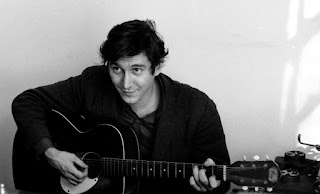I thought there was another week in this theme, so ye'll be spared one of my monster posts of obtuse verbiage and arcane detail: this is, therefore a short piece of obtuse verbiage and arcane detail. The song featured above is not new and may be little known, but says as much as us today, nearly sixty years on, as it did then.
Sadly, despite the suggestion it might, the lyrics are not actually spoonfed out to you in the video, and will need a listen. Thankfully, that is not so hard, given the clear singing diction of the singer, and writer, Phil Ochs. Can you guess what it's about? Who might be the Cops of the World he refers to? The flag, of course, is the giveaway, the term a derogatory phrase attached to Uncle Sam and his finest, dispatched at a moments notice to prop up democracy and the free world, whenever it looks as if trade may be hindered by the actions of nasty foreign types. To be fair, it has been a model that largely seemed to work arguably well, only of late running into the awkward detail that other nations have sussed how it works, and then play differently. Modern warfare just is what it wasn't, with armies and all that a little redundant, as the model morphs into different values and different strategies. That sort of emerged as Vietnam ended rather than was won, with Afghanistan altogether more embarrassing. At least Korea is still undecided, the astonishing fact that, officially, the war is still ongoing. Still, I'll shut up now about the politics. As a Brit, and a goddam pinko one at that, what do I know?
Phil Ochs, who wrote the song, was probably another goddam pinko, although he described himself more as a left social democrat, and was had aims to be a journalist ahead of becoming known as a singer; he later called himself a singing journalist. As the son of a war-scarred doctor, he had a peripatetic childhood, his father struggling to find permanent placements, as his mental health declined. As, initially, a prodigy on clarinet, Ochs developed an interest in politics, and gravitated toward the folk scene in the 1960s Greenwich Village. Guitar was a more appropriate weapon and he swiftly made a name for himself with his songs, laden with a sardonic wit that fitted well with that of his contemporaries, including the young Bob Dylan. Unfortunately, like his father, he suffered with his mental health, eventually taking his own life in 1976, his later years marred by alcoholism and bipolar disorder, itself undiagnosed for some time before, which explained his increasingly bizarre behaviour. Now he is little more than a name, a remnant of the past and of his Dylan associations, like a loopier Rambling Jack Elliott. But he has an interesting legacy: with around 200 songs to his name, many cast a shadow longer than his memory, with lyrics just as prescient as this featured song. Worth checking out, together with this biography.
Above is the version of the song that led me to Ochs and this piece, the song being covered by Michael Weston King, an all round good egg and, currently, one half, with his wife, Lou Dalgleish, the other half, of the retro country duet celebrants, My Darling Clementine. Once also of the coals to Newcastle (UK) americana outfit, the Good Sons, in 2010 he released a song of seven covers and five songs of his own, all protest songs in the best sense of the word, which included, also, songs by Tim Hardin, Bob Dylan and Bobby darin. It's called 'I Didn't Raise My Boy To Be a Soldier', the Ochs song a highlight.






























































































































































































































































































































































































